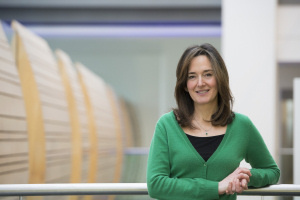Prestigious appointments for two Manchester Professors
09 May 2013
The contribution of two University of Manchester professors to the advancement of medical science has been recognised with their election to the prestigious Fellowship of the Academy of Medical Sciences.

Professor Garth Cooper is a professor in Discovery and Experimental Medicine as well as the Director for the Centre for Advanced Discovery and Experimental Therapeutics. Professor Nancy Papalopulu is a professor of Developmental Neuroscience, Section Head and Wellcome Trust Senior Research Fellow in the Faculty of Life Sciences.
Professors Cooper and Papalopulu are among 44 scientists from across the country chosen from a shortlist of 351 candidates. Academy Fellows are elected for excellence in medical research, for the innovative application of scientific knowledge or for their conspicuous service to healthcare.
Professor Papalopulu joined The University of Manchester from the University of Cambridge in 2006. Soon after arriving, she took on the leadership of the Developmental Biology grouping in the Faculty and more recently she became Head of the Tissue Systems section. Her research studies the development of the nervous system and focuses on understanding at the molecular level how cells decide whether to divide or differentiate, a decision which is key for the correct development of the nervous system. Her most recent discovery was how cyclical fluctuations in levels of proteins and small RNAs regulate the fate that cells adopt.
Professor Papalopulu said she was honoured to be elected to the academy: “Basic research underpins medical discoveries and it is a great honour that my research has been recognised in this way by the country’s leading medical scientists. I am looking forward to serving the community as a Fellow of the Academy of Medical Sciences.”
The Dean of the Faculty of Life Sciences, Professor Martin Humphries added: "I am delighted that Nancy has been elected to the fellowship of the Academy of Medical Sciences, which is a fitting recognition of her numerous contributions to developmental biology. I am sure she will be an active and valuable contributor to the Academy in the years to come."
Professor Cooper joined the University of Manchester from the University of Auckland in 2011. His research centres on discovering the molecular mechanisms that cause chronic diseases such as diabetes, and translating these discoveries into clinical practice by inventing new and more effective medicines. His research has led to the successful development and registration of three new medicines for the treatment of diabetes.
Professor Cooper said: “I am honoured to be elected to the Academy as fundamental research is behind the development of new and more effective ways of treating disease. I am looking forward to contributing to wider society through my role as a fellow.”
Professor Ian Jacobs, Dean of the Faculty of Medical and Human Sciences at The University of Manchester, said the accolade given to Professor Cooper reflected his groundbreaking work in developing new treatments in diabetes. Professor Jacobs said: “This Fellowship is in recognition of exceptional contribution to medicine and is testament to the quality of the research being carried out by Garth in Manchester, which is having a real impact on knowledge and patient care."
The Academy of Medical Sciences acts as an independent organisation to promote advances in medical science and campaigns to ensure these are translated into benefits for patients.
